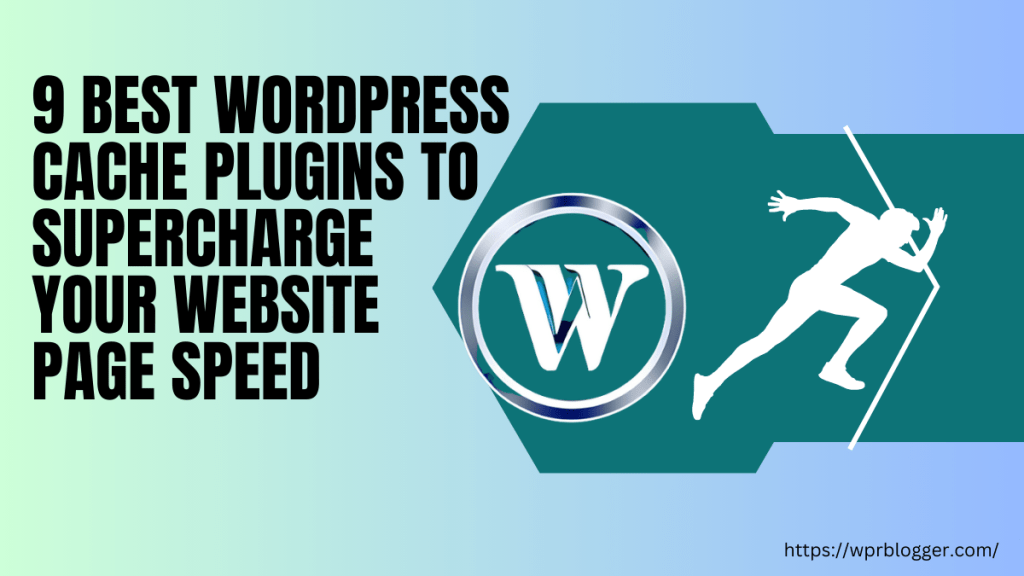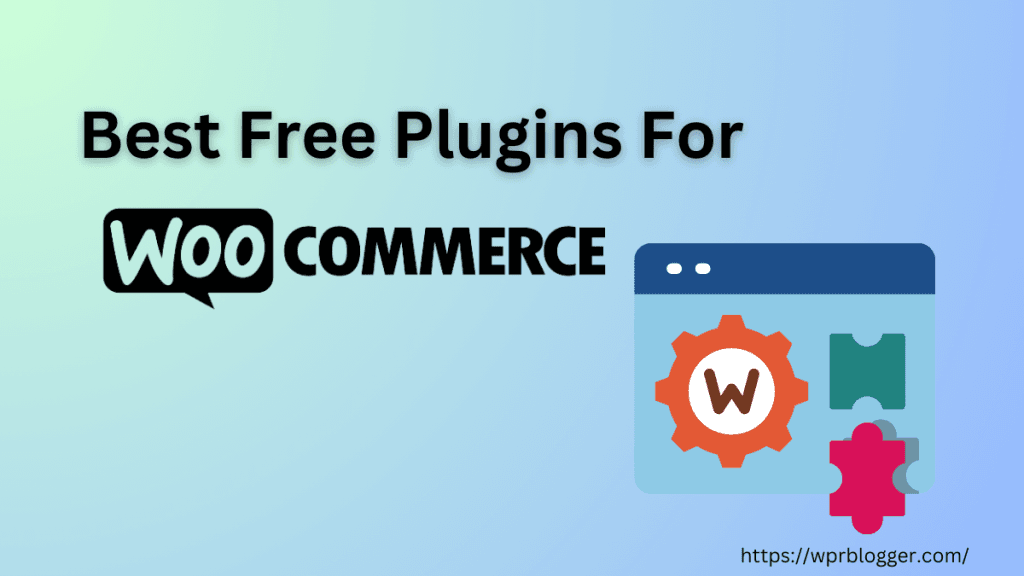WordPress has transformed from a simple blogging platform into a robust content management system capable of powering complex online stores.
At the heart of these online stores are WordPress eCommerce plugins that provide the essential tools to sell products and services.
Choosing the right eCommerce plugin is crucial for the success of your online business. With numerous options available, it can be overwhelming to determine the best fit for your specific needs.
This guide will explore the best WordPress eCommerce plugins, their key features, pros and cons, and factors to consider when selecting.
By understanding each plugin’s strengths and weaknesses, you can make an informed decision that aligns with your business goals and resources.
Let’s dive in!
Tips for Choosing the Right eCommerce Plugin
Selecting the perfect WordPress eCommerce plugin requires carefully considering your business needs.
To help you make the right decision, I’ve tested and used these plugins on a Staging site.
Based on my findings, these factors are crucial for choosing the right eCommerce platform or plugin for your WordPress site.
- Assess your store’s needs – Determine the type of products you’ll sell, the size of your inventory, and the complexity of your shipping requirements.
- Ease of use – The setup or onboarding process should be seamless and easy for anyone to follow through, including beginners.
- Consider your budget and resources – Evaluate the costs associated with the plugin, including licensing fees, transaction fees, and potential development expenses.
- Evaluate plugin support and documentation – Look for plugins with excellent customer support and comprehensive documentation.
- Test different plugins – Take advantage of free trials or demos to experience how different plugins work.
- Customization – Being able to customize every part of your store is one of the most important factors. Look for a plugin that’s flexible and fully customizable.
- Regular updates and security—Choose a plugin with a strong update history, a commitment to security, and large community support.
- Scalability – Consider potential business growth. Choose a platform that supports integrations, extended functionality, third-party applications, etc.
Your tech knowledge and business type determine which factor to consider most important.
However, these guidelines should increase your chances of selecting the eCommerce plugin that best suits your online store.
Top eCommerce WordPress Plugins
With so many options, selecting the ideal eCommerce plugin for your WordPress website can be daunting.
Let’s explore some of the most popular choices.
1. WooCommerce

WooCommerce is the most widely used eCommerce plugin for WordPress. Its popularity stems from its open-source nature, extensive customization options, and robust feature set.
With WooCommerce, you can easily sell physical and digital products, manage inventory, process payments, and handle shipping.
WooCommerce is a free plugin that allows you to set up a basic eCommerce store on WordPress with all essential features. The plugin also lets you connect to payment gateways like WooPayment, Stripe, PayPal, Amazon Pay, and other payment methods and global currencies.
Its vast ecosystem of extensions allows you to tailor your store to specific needs, from marketing and analytics add-ons to accounting, social media integration, and customer support.
WooCommerce has many native and third-party extensions to extend your store functionality, bringing its true power to your store. You can find hundreds of these extensions in its WooCommerce marketplace.
For a step-by-step guide on how to create your WooCommerce store, check our comprehensive guide.
Top Features
- Product management with variations and attributes
- Powerful eCommerce cart and checkout functionality.
- Order management and processing
- Inventory tracking and management
- Shipping and tax calculations
- Payment gateway integration
- Customer accounts and order history
- Coupon and discount management
- Reporting and analytics
Pros
- Highly customizable and flexible
- Large community and extensive support
- Compatible with a wide range of WordPress plugins and themes
- Open-source, allowing for free use and modification
- Handles both physical and digital products.
- Inventory management via website backend.
- Support for global currencies, credit cards, offline payment, and multiple languages.
Cons
- Requires more technical setup compared to some alternatives
- It can become complex, with numerous extensions
2. Ecwid
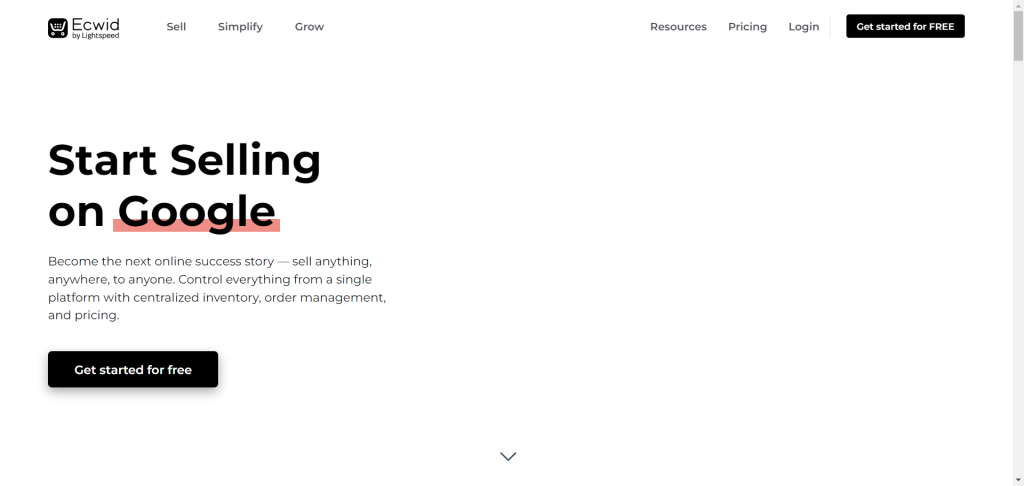
Ecwid is a versatile eCommerce platform that can be embedded into your WordPress website. It’s particularly suitable for small businesses looking for a simple, free WordPress eCommerce plugin and affordable solution.
Ecwid can sell across multiple channels, including your WordPress website, social media, and marketplaces like Amazon, Google Shopping, Etsy, eBay, etc. The plugin connects your WordPress site to the Ecwid platform, allowing you to utilize its online eCommerce tools on your WordPress site.
The Ecwid eCommerce Shopping Cart plugin integrates with major shipping carriers like UPS, FedEx, Canada Post, USPS, and others. Besides, it automatically calculates shipping to help simplify the complexity of shipping calculations.
The social media integration allows you to synchronize and sell directly on the Facebook storefront and Instagram. This feature does not require additional add-ons; Eciwd automatically synchronizes your WordPress site with your Facebook storefront.
It may not have the same depth of features as WooCommerce, but it provides a good starting point for many online stores.
Top Features
- Product catalog management
- Eciwd hosts your store data on its server – alleviating the load on your host.
- Automatic store data backup, updates, and security patches.
- Customizable checkout basket with advanced features.
- Inventory management
- Integrate with WordPress Gutenberg editor for easier content management.
- Order management
- Integrate with various payment gateways.
- Manage customer accounts and orders efficiently
- Mobile Optimization
- Social media integration
Pros
- Easy to set up and use
- Suitable for small businesses
- Multiple sales channel support – sell everywhere.
- It can be embedded in various platforms
- Free plugin with no transaction fee or hidden setup cost.
- Extend core function with third-party extension or via APIs.
- Affordable pricing options
Cons
- Limited advanced features compared to larger platforms
- May have limitations for large-scale stores
- The free plugin restricts selling digital products.
3. Easy Digital Downloads (EDD)
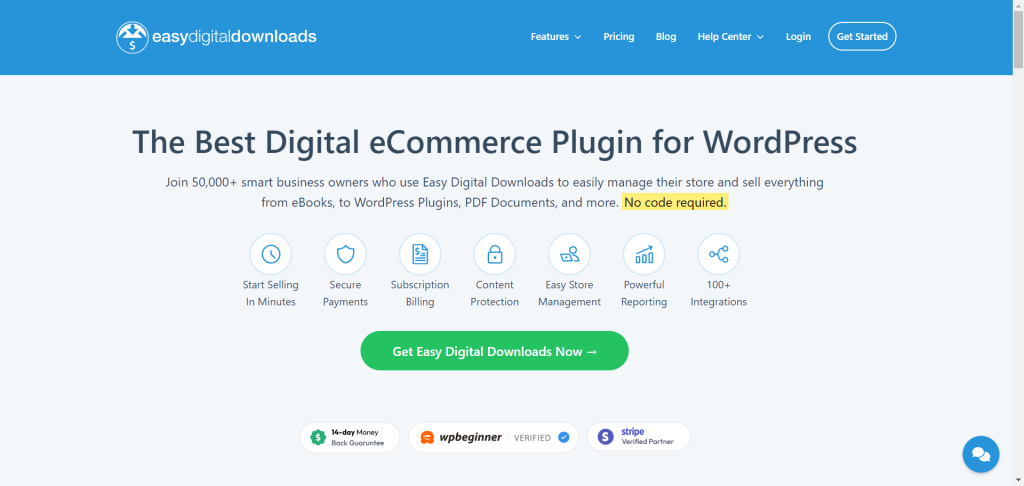
If your business primarily sells digital products like ebooks, music, software, or online courses, Easy Digital Downloads (EDD) is a specialized option.
Designed with digital goods in mind, EDD offers streamlined features such as file downloads, licensing, and payment processing.
Brands like WPforms, WPZoom, and SeedProd use Easy Digital Downloads to sell and manage their software business. It works well for selling downloadable products like plugins and other digitally accessed products.
Easy Digital Download free plugin is sufficient if you’re selling just ebooks. The pro plugin has features like an integrated shopping cart, payment subscription model, custom payment form, unlimited downloads, etc.
Top Features
- Digital product downloads and licensing
- Payment integration with Stripe, Venmo, CashApp, Google Pay, Apple Pay, Sofort, and PayPal.
- Customer accounts and purchase history
- Discount codes and coupons (Pro features)
- Track and process refunds effortlessly.
- Affiliate program integration with AffiliateWP.
- Over 100 extensions and third-party tools to customize and extend core functions.
- File access restrictions
- Advanced sales reporting and analytics.
- Powerful customer management features.
Pros
- Specifically designed for digital products
- Simple and easy to set up
- Efficient file delivery and licensing
- EDD has its WordPress theme, yet it is compatible with other themes.
- Focuses on core features for digital sales
- Integrates with popular payment gateways – Stripe and PayPal.
Cons
- Limited features for physical products
- Smaller community and fewer extensions
4. BigCommerce for WordPress

BigCommerce for WordPress offers a hybrid approach, combining WordPress’s flexibility with the power of a hosted eCommerce platform.
While it’s not a traditional plugin, it seamlessly integrates with WordPress to provide a comprehensive online store solution. It synchronizes your BigCommerce store products with WordPress every five minutes.
BigCommerce handles hosting, security, and performance, allowing you to focus on your products and marketing.
One benefit of BigCommerce is the option to integrate with 65+ payment gateways in over 100 countries and 250 local payment methods. This is good if you sell globally and process payments in multiple currencies.
Like Ecwid, BigCommerce lets you sell across multiple channels, such as Google Shopping, Amazon, eBay, Instagram, Facebook, Square, etc.
Top Features
- Extensive product catalog management
- Shopping cart and checkout functionality
- Support for major shipping companies and offer real-time shopping calculations.
- Add multiple store locations from one account.
- Order management and fulfilment
- Powerful inventory management features
- Compatible with WordPress Classic and Gutenberg editor.
- Marketing and SEO tools
- Multiple payment gateways
- Customer management tools
- Abandoned cart recovery
- Automatically create essential eCommerce pages – signing, checkout, shipping, account profiles, order history, discount, etc.
Pros
- A hosted platform for easier management
- Advanced features for eCommerce business
- Strong security and performance features
- Integration with WordPress for content management
- Access to BigCommerce’s app market
- Suitable for large enterprise businesses with extensive product catalogs.
- Compatible with most WordPress themes.
Cons
- Monthly subscription fee
- Less flexibility compared to WooCommerce
- Reliance on BigCommerce’s infrastructure
- There’s a 12-month sales threshold. When exceeded, your account is automatically upgraded.
5. Shopify

Although not strictly a WordPress plugin, Shopify is a popular hosted eCommerce platform worth mentioning.
It offers a comprehensive solution for online stores, including website design, payment processing, shipping, and marketing tools.
Due to its popularity and large user base, many third-party WordPress developers have created plugins to integrate Shopify functionality into WordPress.
For example, you can embed the Shopify Buy Now button on your WordPress blog to sell products. You can even import your Shopify store to WordPress as a post type and create product pages, checkout carts, etc.
Shopify is a hosted platform, but if you have a WordPress blog, you may also want to market your Shopify product there. Plugins like ShopWP let you connect Shopify with WordPress to sell products.
Top Features
- Robust product management tools.
- Online store design with free and premium Shopify theme.
- Multiple payment processing methods
- No transaction fee when using Shopify Payments.
- Shipping and fulfilment and automated tax calculations.
- Built-in marketing and SEO tools
- Sell in-person and process payments with Shopify POS or bank transfer.
- Customer relationship management
- Extensive Shopify app store.
- Advanced Inventory management
- Order management
Pros
- User-friendly interface
- Comprehensive eCommerce platform
- Strong marketing and sales tools
- Reliable hosting and security
- Large app store
- All in one ecommerce platform.
Cons
- Monthly subscription fees
- Less flexibility compared to self-hosted solutions
- Dependence on Shopify’s platform
6. WPForms

WPForms is not an ecommerce plugin per se, but its built-in payment form integrations with Stripe, PayPal, Authorize.Net, and Square make it a candidate for the best ecommerce WordPress plugins.
Since its primary function is a drag-and-drop form builder, WPForms lets you create donation forms, user registration forms, order forms, QR code forms, subscriptions, and more. It has over 1,500 form templates, making it one of the largest form template libraries in the industry.
Another benefit of using the WPForms plugin for your ecommerce store is its integrations.
WPForms integrates with hundreds of services and tools, such as email marketing, automation, analytics, advertising platforms, page builders, etc. With this, you can easily integrate your store functionality with WPForms to collect and store customers’ data.
Top Features
- Integration with popular payment gateways with no transaction fees.
- Over 1,800 form templates.
- Create smart conditional logic forms.
- Form entry management for easy sorting and analysis.
- Automatic spam protection with advanced form submissions security systems.
- Couple code addon
- Online forms signature addon
- Save and resume form entry/submissions
Pros
- Easy to use and beginner-friendly
- Extensive form templates
- Cost-effective.
- Extensive integration with third-party tools and services.
- Works with payment gateways
- Free plugin available
Cons
- Limited payment method compared to other options.
- Using Stripe with the free plugin attracts a 3% transaction + Stripe payment fee.
7. SureCart
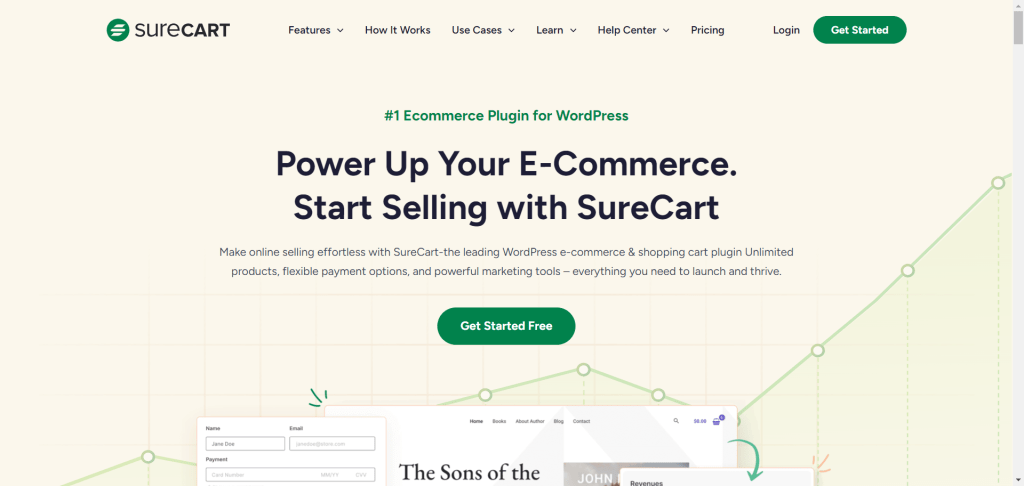
SureCart is a streamlined eCommerce plugin for WordPress users that simplifies online selling. With a strong emphasis on speed and performance, SureCart offers a user-friendly interface that makes it easy to set up and manage your online store.
The same team behind Astra – the most popular WordPress theme – develops the SureCart eCommerce plugin – so you can rest assured of its performance, design customization capability, and functionality.
Unlike many other eCommerce solutions, SureCart provides essential features without overwhelming users with complex options.
This plugin excels at handling physical and digital products, recurring subscriptions, crate membership sites, donations, lead generation, and more. It offers flexible payment options through integration with popular payment gateways. Currently, SureCart supports PayPal, Stripe, Paystack, and Mollie.
Beyond basic product listings, SureCart includes inventory management, order processing, one-click checkout form, and customer management.
While it may not offer the same level of customization as some other platforms, SureCart’s focus on simplicity and efficiency makes it an attractive choice for businesses seeking a quick and effective eCommerce solution.
Top Features
- Product management with variations
- Built-in shopping cart system with advanced functionality
- Build checkout forms with a drag-and-drop builder.
- Real-time tax calculations
- Order management and data processing from every transaction.
- Inventory tracking, automated invoices, and receipts.
- Cart abandonment recovery email features.
- Advanced store customization control with no coding required.
- One-click subscription/recurring payment setup.
- Create discount codes and coupons to encourage more sales.
- Customer accounts and order history
- Basic analytics and reporting
Pros
- User-friendly interface and easy setup
- Focus on speed and performance optimization
- Integration with popular payment gateways
- Built-in marketing tools
- Affordable pricing plans
- Sell everything – digital, physical, recurring, subscriptions, membership, etc.
Cons
- Limited advanced features and payment options compared to some competitors
- Smaller community and ecosystem of extensions
FAQs
What is the best eCommerce plugin for beginners?
WooCommerce is the best starting point for beginners due to its large community, extensive documentation, and user-friendly interface. However, plugins like Ecwid and SureCart also offer simplified setups.
Can I sell both physical and digital products with one plugin?
You can sell physical and digital products using one plugin or platform. However, some digital product focus plugins like EDD are unsuitable for selling physical products. Consider commerce platforms like WooCommerce, SureCart, Shopify, and Ecwid if you plan on selling physical products alongside digital downloadable products.
How do I choose the right eCommerce plugin for my online store?
Consider factors such as the type of products you’ll sell, your budget, technical expertise, desired features, and scalability. Research different plugins, compare their offerings, and read user reviews to make an informed decision.
Are there any free eCommerce plugins available?
WordPress has many free e-commerce plugins you can try. SureCart, WooCommerce, Easy Digital Download, ShopWP, and Memberpress are some of the free options. However, the free version of these plugins offers limited features. You’ll need the Pro plan to access advanced features in most plugins.
Can I sell subscription-based products with WordPress eCommerce plugins?
Many eCommerce plugins allow you to sell subscription-based products and services. Notable plugins that offer subscription features include WooCommerce, SureCart, Shopify, Ecwid, and BigCommerce.
Conclusion
The right eCommerce plugin is essential for building a successful online business.
Carefully evaluate your options, consider your specific needs, and don’t hesitate to experiment with different plugins to find the perfect fit.
With the right tools, you can create a thriving online store that attracts and retains customers.
If you seek my advice, WooCommerce is the best option if you use WordPress as your ecommerce store’s base.
WooCommerce has everything you need to power your online business. From setting up your store design, payment integrations, and product management to taking orders, it has these functions handled efficiently.
The good thing about WooCommerce is the vast extension in its ecosystem. It is well supported by a large developer community. This makes it possible to extend its core function beyond limits.


